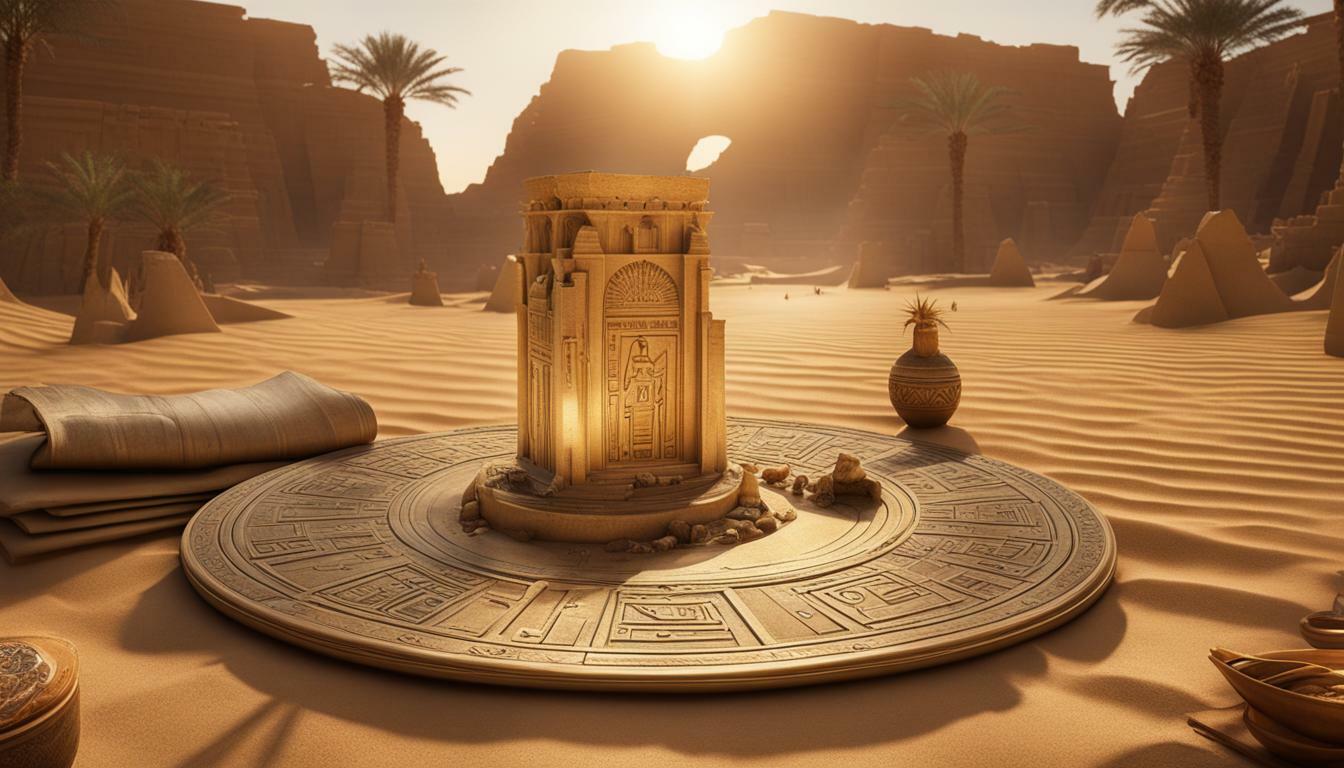Are you ready to dive into the fascinating realm of Egyptian Tarot Cards and unlock the mysteries of life? Tarot decks inspired by ancient Egyptian mythology have deep connections to modern tarot divination. The Egyptians’ preference for order and traditional rules influenced tarot cards, making them an intriguing tool for self-discovery and guidance.
Ancient Egyptian symbolism, numerology, and astrology are intricately woven into tarot decks, providing rich layers of meaning and insight. Some believe that tarot card readings have a strong esoteric connection to ancient Egyptian rituals, such as scarab divination, enhancing the mystical nature of the practice.
The Major Arcana in tarot decks, such as the Rider Waite-Smith, correspond to specific Egyptian mythology, offering a fascinating bridge between ancient wisdom and modern interpretation. Egyptian Tarot Decks, like the Egyptian Tarot Deck by Lo Scarabeo, the Kemetic Tarot Deck, and the Tarot Nefertari Deck, invite seekers to explore the depths of human existence and embark on a journey of personal growth.
Through tarot readings, guided by intuition and synchronicity, you can gain valuable guidance, clarity, and self-reflection. Tarot cards serve as a powerful tool for empowerment and decision-making, offering profound insights into various aspects of life.
Key Takeaways:
- Egyptian Tarot Cards draw inspiration from ancient Egyptian mythology, incorporating symbolism, numerology, and astrology.
- Tarot readings have an esoteric connection to ancient Egyptian rituals, adding a mystical element to the practice.
- Specific Egyptian mythology corresponds to the Major Arcana in tarot decks, deepening the understanding of the cards.
- Popular Egyptian Tarot Decks, such as the Egyptian Tarot Deck by Lo Scarabeo, offer profound insights into human existence and personal growth.
- Tarot readings, guided by intuition and synchronicity, provide guidance, clarity, and self-reflection for seekers.
The Intricate Connection Between Egyptian Tarot Cards and Ancient Egypt
Egyptian Tarot Cards have a deep connection to ancient Egypt, incorporating symbolism, numerology, and astrology from this fascinating civilization. Tarot decks inspired by ancient Egyptian mythology have become an integral part of modern tarot divination, offering seekers a unique and mystical tool for unlocking mysteries and gaining clarity.
Ancient Egyptian symbolism, with its rich tapestry of gods, goddesses, and sacred imagery, forms the foundation of Egyptian Tarot Cards. Each card is steeped in the mystical beliefs and practices of this ancient civilization, allowing for a profound connection to its wisdom and insights.
Numerology and astrology, both highly regarded by the Egyptians, are intricately woven into the fabric of Egyptian Tarot Cards. The placement of the planets, the alignment of the stars, and the numerical significance of each card provide a deeper understanding of their meanings and interpretations.
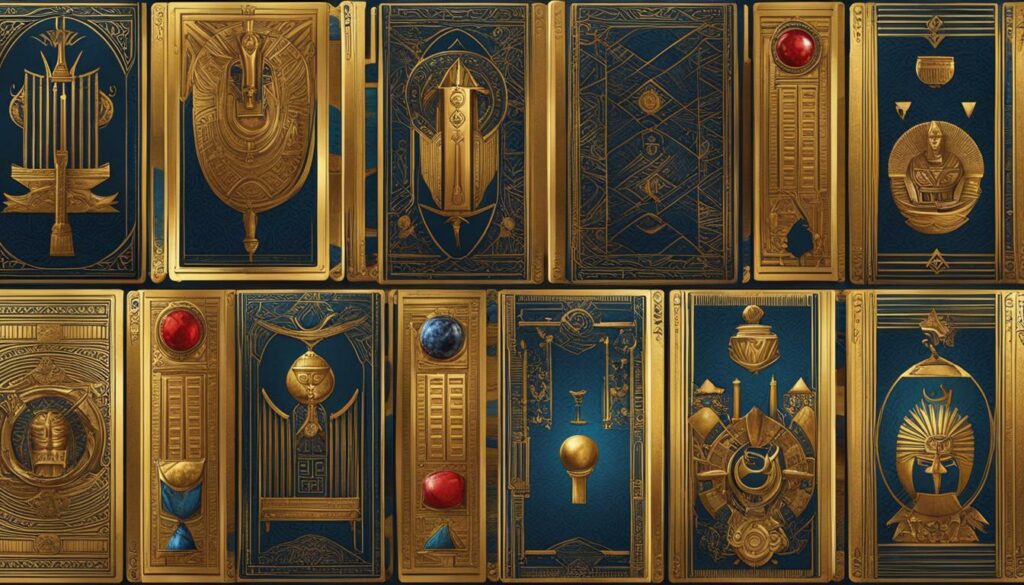
Furthermore, some believe that tarot card readings have a strong esoteric connection to ancient Egyptian rituals. For instance, scarab divination, a practice popular in ancient Egypt, involved the interpretation of scarab beetle movements to gain insight into the future. This connection highlights the enduring spiritual and mystical tradition of tarot cards and their ability to tap into ancient wisdom.
The intricate connection between Egyptian Tarot Cards and ancient Egypt offers seekers a profound and enlightening experience. By delving into the symbolism, numerology, and astrology of this ancient civilization, Egyptian Tarot Cards provide a pathway to self-discovery, personal growth, and the unlocking of hidden mysteries.
The Esoteric Connection: Egyptian Tarot Cards and Ancient Rituals
Many believe that tarot card readings have a strong esoteric connection to ancient Egyptian rituals, offering seekers a unique perspective. The ancient Egyptians were known for their deep fascination with the spiritual realm and their belief in the power of divination. It is no surprise that tarot decks inspired by ancient Egyptian mythology reflect this connection.
Egyptian tarot decks incorporate symbols, numerology, and astrology derived from ancient Egyptian culture. Each card carries profound meaning, drawing from the rich tapestry of Egyptian mythology and history. The symbolism of the cards is rooted in the Egyptian pantheon of gods and goddesses, their sacred animals, and their rituals.
Furthermore, some tarot enthusiasts believe that tarot card readings can tap into the same esoteric energy that ancient Egyptians used in their divination practices, such as scarab divination. This connection with ancient rituals adds an extra layer of depth and mysticism to the tarot reading experience.
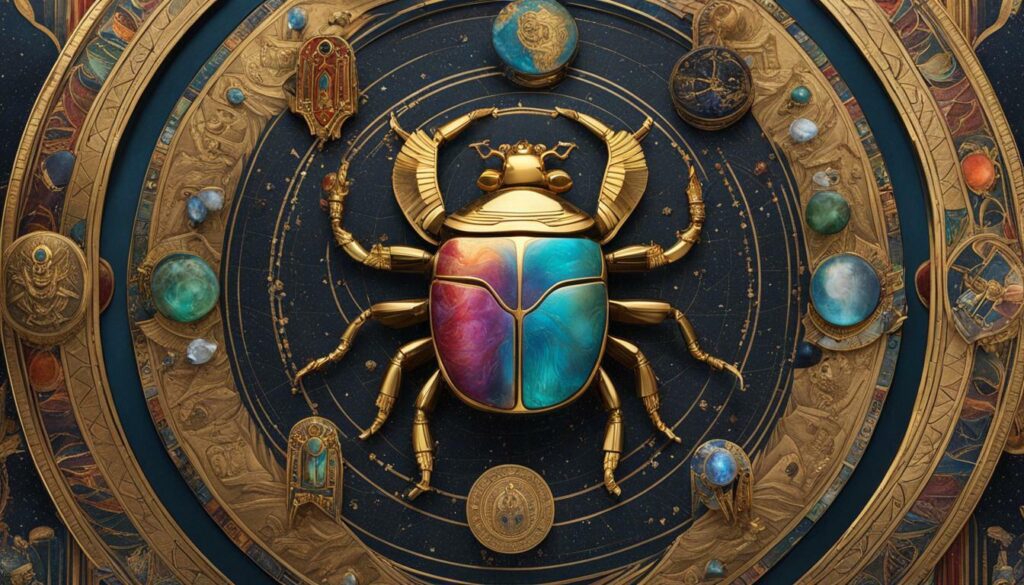
Unlocking Ancient Wisdom: Egyptian Tarot Symbols
The Egyptian tarot symbols are a key aspect of understanding the esoteric connection between tarot cards and ancient Egyptian rituals. Each symbol holds a specific meaning and carries the energy of a particular deity or concept.
| Symbol | Meaning |
|---|---|
| Ankh | The symbol of life and vitality, representing eternal existence. |
| Eye of Horus | A symbol of protection and good health, attributed to the sky god Horus. |
| Scarab | Symbolizes rebirth, transformation, and the eternal cycle of life. |
| Isis | The goddess of magic and motherhood, representing healing and intuition. |
These are just a few examples of the many Egyptian symbols found in tarot decks. Each symbol holds a unique energy that can provide deeper insights into the seeker’s journey.
By exploring the esoteric connection between Egyptian tarot cards and ancient rituals, seekers can unlock a world of ancient wisdom and gain a fresh perspective on their own spiritual journey.
Correspondence Between Tarot and Egyptian Mythology
The Major Arcana in tarot decks, such as the Rider Waite-Smith, have direct correspondences to specific Egyptian mythology, adding depth to the cards’ meanings. Each card in the Major Arcana represents a significant life lesson and is associated with Egyptian deities and symbols that embody their essence.
For example, the High Priestess card in the Rider Waite-Smith deck draws inspiration from the Egyptian goddess Isis, who symbolizes wisdom, intuition, and the hidden mysteries of the universe. The card’s imagery reflects the religious significance of Isis, with her crown and veil representing her divine authority and her role as the keeper of sacred knowledge.
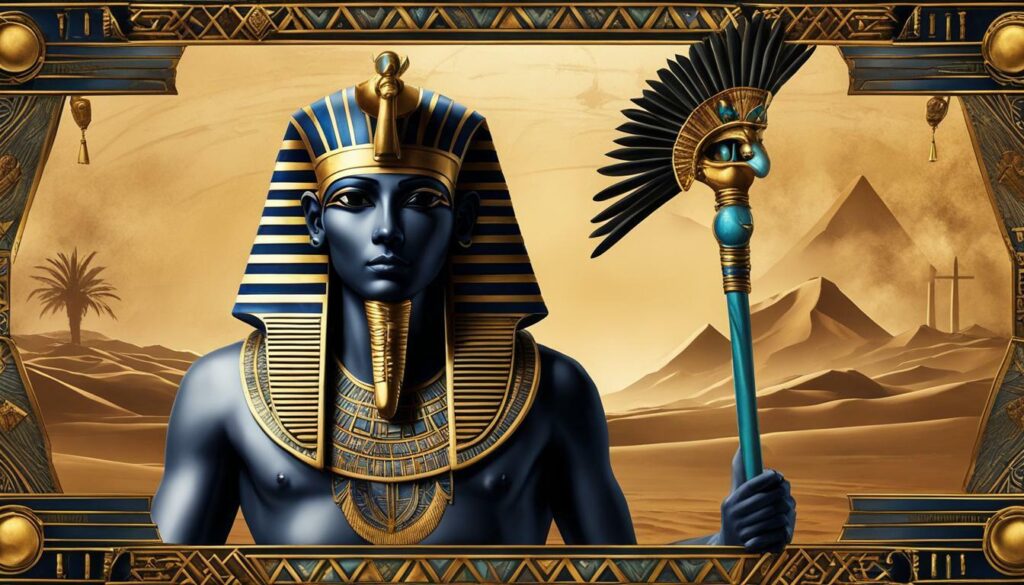
Another notable correspondence is the Death card, which is associated with the Egyptian god Osiris. In Egyptian mythology, Osiris represents resurrection and the cycles of life and death. The card’s symbolism, such as the skeleton and the rising sun, reflects the transformative nature of death and the promise of new beginnings.
Ancient Egyptian symbolism in tarot cards:
- The Ankh: Symbolizing eternal life, the ankh can be found in various tarot cards like the Empress, representing nurturing and fertility.
- The Eye of Horus: A powerful symbol of protection and clarity, the Eye of Horus can be seen in the Hierophant card, symbolizing divine guidance and spiritual wisdom.
- The Scarab Beetle: Representing rebirth and regeneration, the scarab beetle is prominently featured in the Strength card, symbolizing inner strength and resilience.
A deeper understanding of the correspondences between Egyptian mythology and tarot can enhance the interpretation of tarot card readings. Exploring these connections allows seekers to tap into the rich symbolism and wisdom of ancient Egypt, bringing a unique perspective to their spiritual journey.
| Egyptian Deity | Major Arcana Card |
|---|---|
| Isis | High Priestess |
| Osiris | Death |
| Thoth | The Magician |
| Horus | The Emperor |
| Anubis | Judgment |
Egyptian Tarot Decks for Deeper Insights
Egyptian Tarot Decks like the Egyptian Tarot Deck by Lo Scarabeo, the Kemetic Tarot Deck, and the Tarot Nefertari Deck provide seekers with a profound exploration of human existence and personal growth. Inspired by ancient Egyptian mythology, these decks offer a unique and captivating journey into the mysteries of life.
The Egyptian Tarot Deck by Lo Scarabeo beautifully combines the symbolism and imagery of ancient Egypt with the rich tradition of tarot. Each card is meticulously crafted to depict iconic Egyptian deities, pharaohs, and symbols, allowing for a deep connection to the ancient world. This deck provides seekers with a powerful tool for self-reflection, offering insights into the complexities of the human experience.
The Kemetic Tarot Deck draws its inspiration from the spiritual beliefs and practices of ancient Egypt, known as Kemeticism. This deck incorporates the wisdom of Egyptian gods and goddesses, guiding seekers through the realms of spirituality, divination, and personal transformation. The Kemetic Tarot Deck offers a profound exploration of the connections between the earthly and divine realms.
The Tarot Nefertari Deck is an exquisite representation of the Queen Nefertari, known for her beauty and wisdom. This deck beautifully weaves together the story of Nefertari with the archetypal symbolism of tarot, creating a unique and evocative tool for self-discovery. Each card in this deck offers profound insights into personal growth, empowerment, and spiritual alignment.
| Deck | Author | Key Features |
|---|---|---|
| Egyptian Tarot Deck by Lo Scarabeo | Giulia F. Massaglia | Stunning artwork depicting Egyptian deities and symbols |
| Kemetic Tarot Deck | Taschen Publishing | Incorporates the spiritual beliefs of ancient Egypt |
| Tarot Nefertari Deck | Lo Scarabeo | Highlights the wisdom and beauty of Queen Nefertari |
“The Egyptian Tarot Deck by Lo Scarabeo is a true masterpiece that immerses you in the enchanting world of ancient Egypt. Each card is a gateway to profound wisdom and transformation.” – Maria, Tarot Enthusiast
Embark on a journey of self-discovery and spiritual growth with these Egyptian Tarot Decks. Allow the mystical energy of ancient Egypt to guide you towards deeper insights and understanding. Whether you are a seasoned tarot reader or a curious beginner, these decks offer a captivating experience that will unlock the mysteries of your soul.
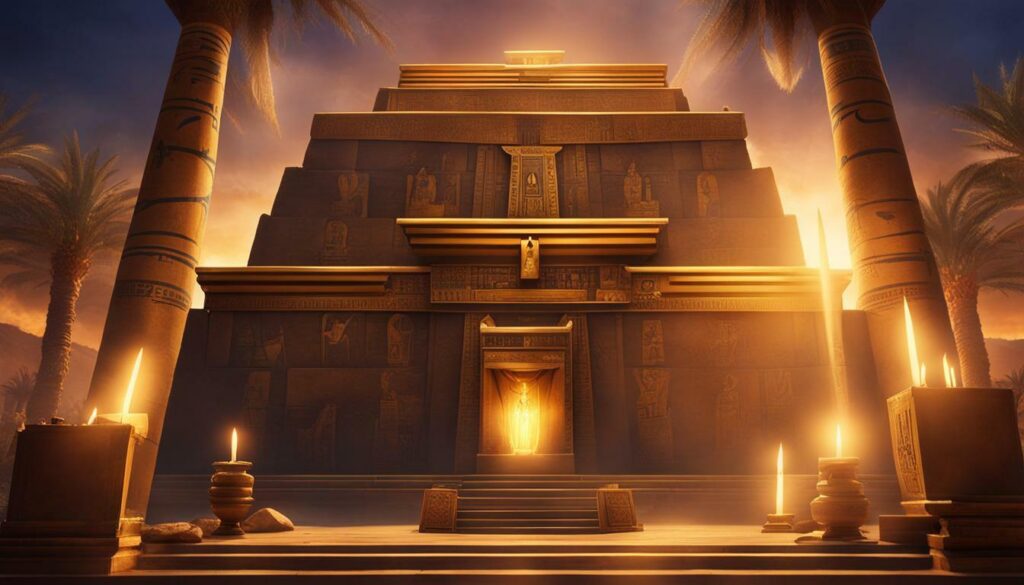
Exploring the Ancient Wisdom
The Egyptian Tarot Decks provide a unique opportunity to explore the ancient wisdom of Egypt. Each card is infused with symbolism and meaning derived from the rich tapestry of Egyptian mythology. By working with these decks, you can tap into the power of the pharaohs, gods, and goddesses, gaining deeper insights into your own life and spiritual path.
- Delve into the Major Arcana to uncover significant life lessons and archetypal energies that resonate with ancient Egyptian mythology.
- Explore the Minor Arcana suits, such as Wands, Cups, Swords, and Pentacles, each associated with specific aspects of life and reflecting the Egyptian worldview.
- Connect with the divine energies embodied in the deck, allowing the wisdom of ancient Egypt to guide you on your personal journey of growth and self-discovery.
Whether you are seeking answers to specific questions or looking for general guidance, the Egyptian Tarot Decks offer a powerful tool for unlocking the mysteries of your life. Embrace the wisdom of the ancients and embark on a transformative journey that will leave you enlightened and empowered.
Tarot Readings for Guidance and Clarity
Tarot readings, using intuition and synchronicity, have the ability to offer seekers guidance, clarity, and the opportunity for self-reflection. By tapping into the ancient wisdom of Egyptian Tarot Cards, you can unlock the mysteries of your life and gain valuable insights.
When it comes to tarot readings, the cards act as a mirror, reflecting your innermost thoughts, emotions, and desires. As you shuffle the deck and lay out the cards, the patterns and symbols on each card reveal a story unique to you. A skilled tarot reader interprets these symbols, helping you gain clarity on your current situation, understand your past experiences, and gain insight into your future potential.
Through a tarot reading, you can receive guidance on relationships, career choices, personal growth, and spiritual development. The cards provide a spiritual roadmap, offering suggestions and possibilities that can empower you to make informed decisions and take action.
| Key Benefits of Tarot Readings |
|---|
| 1. Gain clarity and insight into your life’s challenges and opportunities. |
| 2. Find guidance in making important decisions. |
| 3. Discover your strengths, weaknesses, and hidden talents. |
| 4. Explore your spiritual path and inner journey. |
Remember, a tarot reading is not about predicting the future with certainty, but rather about providing guidance and empowering you to make choices that align with your true self. It’s a tool for self-reflection and personal growth, allowing you to tap into your intuition and explore the deeper layers of your consciousness.
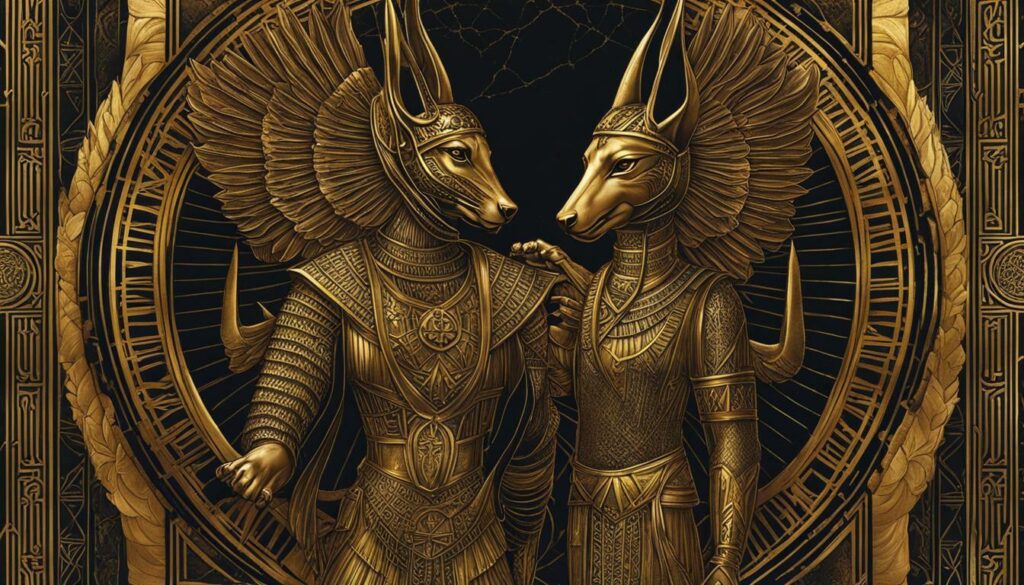
So, if you’re seeking guidance, clarity, and the opportunity for self-reflection, consider tapping into the wisdom of Egyptian Tarot Cards. Unlock the mysteries of your life, discover your true potential, and embark on a transformative journey of self-discovery.
Ethical Responsibility in Tarot Card Readings
Conducting tarot card readings comes with the ethical responsibility of respecting the seeker’s boundaries and offering guidance with empathy and compassion. As a tarot reader, it is crucial to create a safe and non-judgmental space for the seeker to explore their questions and concerns. This involves honoring their privacy, maintaining confidentiality, and providing an atmosphere free from bias or personal agendas.
Building trust is essential when conducting tarot card readings. Seekers often share vulnerable aspects of their lives, seeking guidance and clarity. It is our duty as tarot readers to approach their stories with sensitivity and without judgment. This means acknowledging their experiences and emotions, even if they differ from our own beliefs or values.
One way to ensure ethical responsibility is to obtain informed consent from the seeker before the reading begins. This allows them to be fully aware of the nature of the reading and what to expect. It also gives them the opportunity to establish any boundaries or topics they are not comfortable discussing. Respecting these boundaries throughout the reading is of utmost importance.
Quotes:
“Tarot readings provide an opportunity for seekers to gain insight and guidance in their lives. As readers, we must remember that the seeker is ultimately responsible for their own decisions and actions. Our role is to offer support, perspective, and possible outcomes, but never to impose our own beliefs or influence their choices.” – Tarot Reader
“Empathy and compassion are the cornerstones of ethical tarot readings. We must strive to understand the seeker’s emotions, concerns, and aspirations without judgment. By creating a safe and nurturing environment, we can help them navigate their journey with clarity and empowerment.” – Tarot Reader
Table: Principles of Ethical Tarot Reading
| Principle | Explanation |
|---|---|
| Confidentiality | Respecting the seeker’s privacy by keeping their reading confidential and refraining from sharing personal details without explicit permission. |
| Non-judgment | Approaching the reading with an open mind, free from bias or personal judgments, and providing guidance that is accepting and inclusive. |
| Informed consent | Obtaining the seeker’s consent before the reading, ensuring they understand the nature of the reading and have the opportunity to establish boundaries. |
| Empathy and compassion | Showing understanding and compassion towards the seeker’s experiences and emotions, providing support without imposing personal beliefs. |
By upholding these principles of ethical responsibility, tarot card readings can offer seekers a transformative and empowering experience. It is our duty as tarot readers to guide them through their journey with empathy, respect, and a grounded perspective. Together, we can unlock the mysteries of their lives and help them find clarity and personal growth.
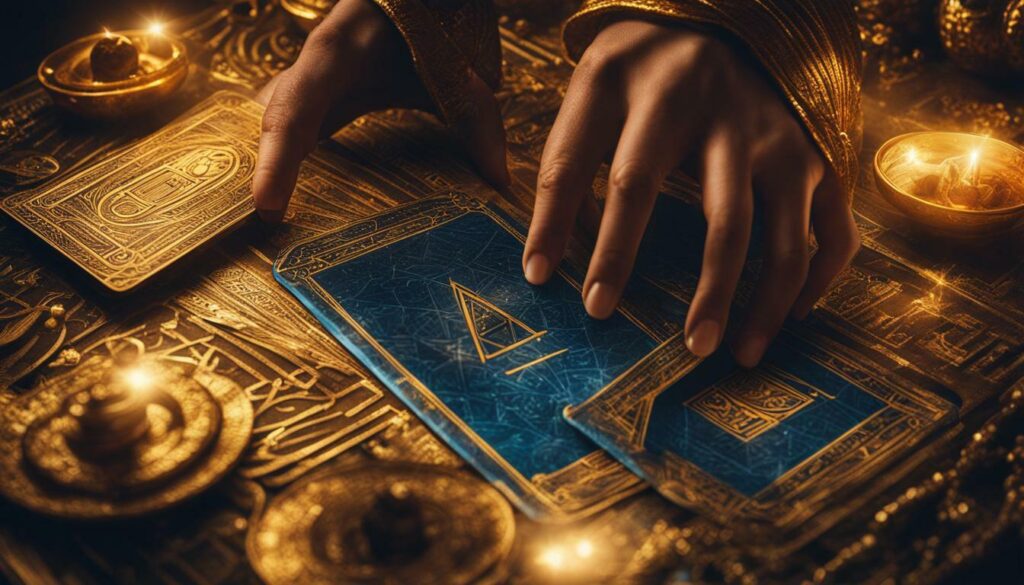
Psychological Mechanisms Behind Tarot’s Effectiveness
Tarot’s effectiveness can be understood through psychological mechanisms like the placebo effect, the Barnum effect, and confirmation bias, which play a role in the interpretation and reception of tarot card readings. The placebo effect refers to the phenomenon where an individual’s belief in the efficacy of a treatment or practice can produce real, tangible effects. In the context of tarot readings, a person’s belief in the cards’ ability to provide guidance and insight can create a psychological state conducive to self-reflection and personal growth.
The Barnum effect, named after the famous showman P.T. Barnum, is the tendency for individuals to accept vague or general statements about themselves as highly accurate and tailored specifically to them. Tarot readings often involve ambiguous or open-ended interpretations, allowing individuals to project their own experiences, desires, and emotions onto the cards. This subjective interpretation can lead to a sense of validation and insight, even if the information provided is general in nature.
Confirmation bias is another psychological mechanism that can contribute to the perceived effectiveness of tarot card readings. This cognitive bias predisposes individuals to seek out, interpret, and remember information that confirms their existing beliefs or desires. In the context of tarot, seekers may focus on the cards or interpretations that align with their current circumstances, leading to a sense of affirmation and validation.
Table: Psychological Mechanisms Behind Tarot’s Effectiveness
| Psychological Mechanism | Description |
|---|---|
| Placebo Effect | An individual’s belief in the efficacy of tarot card readings can influence their psychological state and promote self-reflection and personal growth. |
| Barnum Effect | Open-ended interpretations in tarot readings allow individuals to project their own experiences, desires, and emotions onto the cards, providing a sense of validation and insight. |
| Confirmation Bias | Seekers may focus on cards or interpretations that align with their existing beliefs or desires, leading to a sense of affirmation and validation. |
While these psychological mechanisms contribute to the perceived effectiveness of tarot card readings, it is important to approach them with respect, empathy, and a grounded perspective. Tarot readings should not be seen as definitive or predictive, but rather as a tool for self-reflection, exploration, and personal growth. By understanding the psychological mechanisms at play, we can appreciate the transformative potential of tarot while acknowledging its limitations.
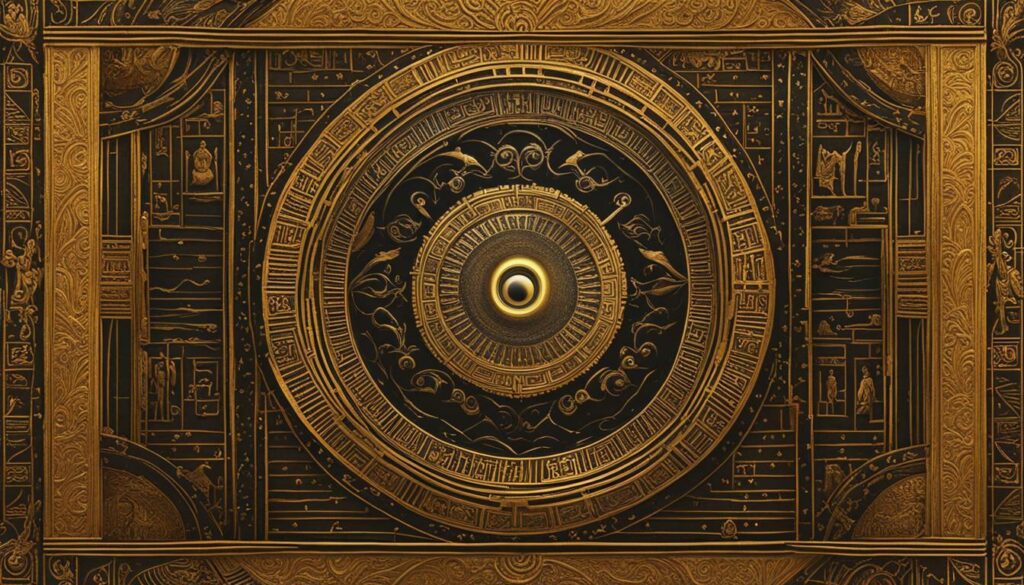
The Structure and Interpretation of Tarot Cards
The tarot deck consists of 78 cards, each with its own symbolism and meaning, including the Major Arcana and the Minor Arcana, which are interpreted through various spreads and the reader’s intuition. The Major Arcana, often referred to as the “trump cards,” consists of 22 cards that represent significant life lessons and archetypal energies. These cards carry powerful imagery and symbolism, depicting universal themes such as love, death, and transformation.
The Minor Arcana comprises four suits: Wands, Cups, Swords, and Pentacles. Each suit consists of ten numbered cards (Ace to Ten) and four Court Cards (Page, Knight, Queen, and King). The Minor Arcana cards provide further insights into specific areas of life, offering guidance and shedding light on everyday challenges and experiences.
Interpreting tarot cards involves considering the card’s symbolism, imagery, and placement within a spread. Different tarot spreads, such as the Celtic Cross or the Three-Card Spread, provide a framework for exploring different aspects of a situation or gaining deeper insights. The reader’s intuition also plays a vital role in interpreting the cards, as they connect with their own inner wisdom and tap into the energy of the seeker.
Sample Tarot Card Interpretation:
“The Ace of Cups represents new beginnings and emotional fulfillment. It signifies the potential for deep love, compassion, and emotional healing. When this card appears in a reading, it suggests that the seeker is entering a phase of emotional growth and connection. It may indicate the start of a new romantic relationship, the deepening of an existing bond, or the need to nurture oneself and explore inner emotions. The Ace of Cups invites the seeker to open their heart and embrace the abundance of love and compassion that surrounds them.”
Tarot card readings offer a profound and enlightening experience, providing clarity, guidance, and personal transformation. They can help individuals gain insight into their current circumstances, make informed decisions, and navigate life’s challenges. However, it is essential to approach tarot readings with respect, empathy, and a grounded perspective. Tarot cards should never be seen as predicting the future, but rather as a tool for self-reflection and empowerment. The interpretation of tarot cards is subjective, and the seeker always has the power to shape their own destiny.
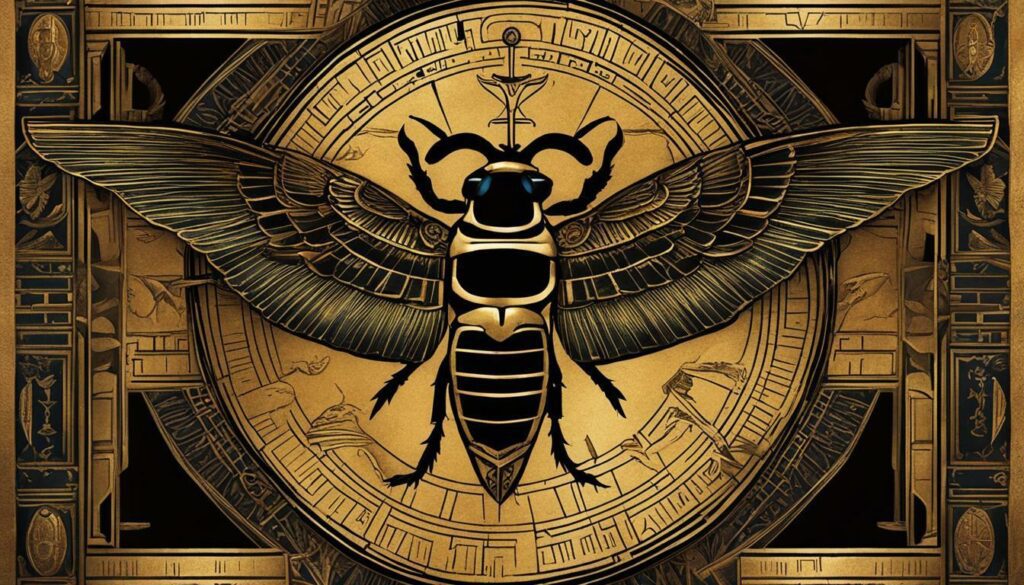
Table: Common Tarot Card Meanings
| Card | Meaning |
|---|---|
| The Fool | Beginnings, spontaneity, new opportunities |
| The Magician | Manifestation, willpower, divine inspiration |
| The Empress | Nurturing, abundance, fertility |
| The Emperor | Authority, structure, leadership |
| The High Priestess | Intuition, wisdom, divine knowledge |
Conclusion
Egyptian Tarot Cards offer seekers a profound and enlightening experience, providing clarity, guidance, and the potential for personal transformation. Inspired by ancient Egyptian mythology, these tarot decks hold deep connections to the practice of modern tarot divination. Drawing from the Egyptians’ preference for order and traditional rules, tarot cards incorporate symbolism, numerology, and astrology intricately woven into their designs.
Some believe that tarot card readings have an esoteric connection to ancient Egyptian rituals, including scarab divination. The Major Arcana in tarot decks, such as the renowned Rider Waite-Smith, correspond to specific Egyptian mythological figures and themes, adding another layer of depth and meaning to the cards.
For those seeking deeper insights into human existence and personal growth, a variety of Egyptian Tarot Decks are available. The Egyptian Tarot Deck by Lo Scarabeo, the Kemetic Tarot Deck, and the Tarot Nefertari Deck offer unique perspectives and interpretations that can guide individuals on their paths to self-discovery.
When engaging in tarot readings, the intuitive nature of the practice combined with synchronicity can provide seekers with guidance, clarity, and moments of deep self-reflection. However, it is essential to approach tarot card readings with ethical responsibility, ensuring respect, empathy, and a grounded perspective are maintained.
Tarot’s effectiveness can be explained through psychological mechanisms such as the placebo effect, the Barnum effect, and confirmation bias. While these mechanisms shed light on why tarot readings can resonate with individuals, it is important to acknowledge that the power of tarot lies in its ability to tap into one’s intuition and provide unique insights.
The tarot deck itself consists of 78 cards, each carrying its own symbolism and meaning. The Major Arcana represents significant life lessons and archetypal energies, while the Minor Arcana is composed of four suits, each associated with specific aspects of life and personal growth.
Interpreting tarot cards involves considering the card’s symbolism, imagery, and placement within a spread, as well as the reader’s intuition and the seeker’s energy. Tarot card readings offer a profound and enlightening experience, providing clarity, guidance, and the potential for personal transformation.
FAQ
Q: How do Egyptian Tarot Cards unlock mysteries?
A: Egyptian Tarot Cards draw upon ancient Egyptian mythology, symbolism, and astrology to offer deeper insights into human existence and personal growth. Through tarot card readings, seekers can gain guidance, clarity, and self-reflection.
Q: What is the connection between Egyptian Tarot Cards and ancient Egypt?
A: Egyptian Tarot Cards are inspired by ancient Egyptian mythology and incorporate symbols, numerology, and astrology. The Egyptians’ preference for order and traditional rules influenced the development of tarot cards.
Q: Are tarot card readings connected to ancient Egyptian rituals?
A: Some believe that tarot card readings have a strong esoteric connection to ancient Egyptian rituals, such as scarab divination. This connection adds depth and spiritual significance to the practice of tarot reading.
Q: How does Egyptian mythology correspond to the Major Arcana in tarot decks?
A: The Major Arcana in tarot decks, like the Rider Waite-Smith, have specific correspondences to Egyptian mythology. These connections enhance the symbolism and meaning of the cards, providing a rich context for interpretation.
Q: Which Egyptian Tarot Decks offer deeper insights?
A: Popular Egyptian Tarot Decks, such as the Egyptian Tarot Deck by Lo Scarabeo, the Kemetic Tarot Deck, and the Tarot Nefertari Deck, offer deeper insights into human existence and personal growth, providing unique perspectives and symbolism.
Q: How do tarot readings provide guidance and clarity?
A: Tarot readings, guided by intuition and synchronicity, offer seekers guidance, clarity, and self-reflection. The cards serve as a tool to tap into one’s subconscious and explore different perspectives and possibilities.
Q: What ethical responsibilities should be maintained during tarot card readings?
A: Tarot card readings should be approached with respect, empathy, and a grounded perspective. Ethical responsibilities include ensuring the privacy and confidentiality of the seeker, providing unbiased interpretations, and practicing with a sincere intention to help and empower.
Q: How does psychology explain the effectiveness of tarot card readings?
A: Psychological mechanisms such as the placebo effect, the Barnum effect, and confirmation bias can explain the perceived effectiveness of tarot card readings. However, it’s important to approach tarot with an open mind and recognize the potential for personal growth and insight.
Q: What is the structure of the tarot deck and how are the cards interpreted?
A: The tarot deck consists of 78 cards, including the Major Arcana and Minor Arcana. Each card contains unique symbolism and meaning. Interpretation involves considering the card’s symbolism, imagery, and placement within a spread, as well as the reader’s intuition and the seeker’s energy.
Q: What is the significance of Egyptian Tarot Cards for personal transformation?
A: Egyptian Tarot Cards serve as a powerful tool for empowerment, decision-making, and personal transformation. Through tarot card readings, seekers can gain profound insights, clarity, and guidance, ultimately leading to personal growth and enlightenment.
